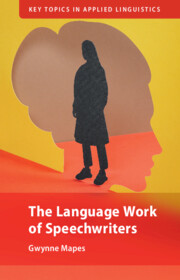Book contents
- The Language Work of Speechwriters
- Key topics in applied linguistics
- The Language Work of Speechwriters
- Copyright page
- Dedication
- Contents
- Figures
- Tables
- Acknowledgments
- 1 Introduction
- 2 Parameters of Professionalism
- 3 Invisibility, Materiality, and Erasure
- 4 Craft, Creativity, and Distinction
- 5 Virtue, Transgression, and Value
- 6 Reappraising Language Work
- Book part
- Glossary
- References
- Index
5 - Virtue, Transgression, and Value
Published online by Cambridge University Press: 31 October 2025
- The Language Work of Speechwriters
- Key topics in applied linguistics
- The Language Work of Speechwriters
- Copyright page
- Dedication
- Contents
- Figures
- Tables
- Acknowledgments
- 1 Introduction
- 2 Parameters of Professionalism
- 3 Invisibility, Materiality, and Erasure
- 4 Craft, Creativity, and Distinction
- 5 Virtue, Transgression, and Value
- 6 Reappraising Language Work
- Book part
- Glossary
- References
- Index
Summary
Chapter 5 examines how speechwriters’ claims to transgressive agency are a source for “affective binding” (see Comer 2022) and status production, contributing to the “virtuous outlaw” identity of the speechwriter community. Mapes’ focus here is rooted in affect studies (e.g. Ahmed 2004) and notions of emotional labor (e.g. Hochschild 2012), as well as the rather prolific scholarship concerning professional/personal identity as it emerges in workplace discourse (e.g. Holmes 2007). What comes to the fore is the way in which emotion is complicatedly entangled with the “semiotic ideologies” of one’s professional life (see again Keane 2018). Focusing on both Professional Speechwriting course materials as well as a video-recorded meeting between members of the Speechwriter Organization, Mapes demonstrates how participants characterize their professional expertise as especially superior to that of (hypothetical) speakers. In framing themselves as uniquely skilled and knowledgeable, speechwriters deem their transgressive professional practices as virtuous and admirable, allowing them to claim power and status within the neoliberal linguistic marketplace.
Keywords
Information
- Type
- Chapter
- Information
- The Language Work of Speechwriters , pp. 134 - 161Publisher: Cambridge University PressPrint publication year: 2025
Accessibility standard: WCAG 2.1 AA
Why this information is here
This section outlines the accessibility features of this content - including support for screen readers, full keyboard navigation and high-contrast display options. This may not be relevant for you.Accessibility Information
Content Navigation
Allows you to navigate directly to chapters, sections, or non‐text items through a linked table of contents, reducing the need for extensive scrolling.
Provides an interactive index, letting you go straight to where a term or subject appears in the text without manual searching.
Reading Order & Textual Equivalents
You will encounter all content (including footnotes, captions, etc.) in a clear, sequential flow, making it easier to follow with assistive tools like screen readers.
You get concise descriptions (for images, charts, or media clips), ensuring you do not miss crucial information when visual or audio elements are not accessible.
Visual Accessibility
You will still understand key ideas or prompts without relying solely on colour, which is especially helpful if you have colour vision deficiencies.
Structural and Technical Features
You gain clarity from ARIA (Accessible Rich Internet Applications) roles and attributes, as they help assistive technologies interpret how each part of the content functions.
